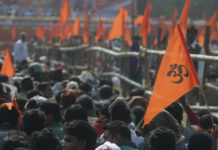Over 50 prominent Muslim activists – representing a wide political and theological spectrum of the community – have signed an open letter denouncing London police commander Mak Chishty’s call for Muslim children to be monitored for signs of radicalisation.
The activists say that Chishty, who is charged with engaging with the Muslim community, has conflated traditional Islamic beliefs and legitimate political activism with extremism. They add that his comments have further undermined trust between the Muslim community and the police.
Here is the letter in full:
Sir Bernard Hogan-Howe
Commissioner of Police of the Metropolis
New Scotland Yard
8-10 Broadway
London
SW1H 0BG
26 May 2015
Dear Commissioner Hogan-Howe,
Re: Commander Mak Chishty’s Recent Comments
Subscribe to our newsletter and stay updated on the latest news and updates from around the Muslim world!
We write to express our deep concern about recent comments made by Mak Chishty, currently the Commander for Engagement in the Metropolitan Police.
Justifying his call for the greater monitoring of the “private spaces” of Muslims, Commander Chishty conflates traditional Islamic beliefs and practices with early indicators of “extremism”.
In this regard, he identifies as causes for concern the sudden adoption of negative attitudes among young people towards, for example, alcohol, certain social occasions and Western clothing. At a time when the limited resources of the government and police are already stretched in tackling the adverse consequences of teenage alcohol abuse, it is counterproductive to treat young people who decide to become teetotal with suspicion.
Commander Chishty’s other supposed indicators of “radicalization” are in many ways typical of the experiences of all teenagers making the difficult transition to adulthood.
Parents can struggle to identify whether or not their children are behaving like “normal teenagers”, or falling into depression. Many symptoms of depression, such as isolation, antisocial or aggressive habits, and a change in sleeping or eating patterns, are typical for teenagers undergoing difficult and complex hormonal changes, only for Muslim children, these are demonised.

By connecting these to “radicalisation,” Commander Chishty is adding to the burdens the parents of Muslim children must carry.
For Commander Chishty to use as an example of “radicalisation”, a refusal to celebrate Christmas is highly problematic.
Would he take such a line with regard to members of other faiths who do not celebrate Christmas such as Jehovah’s Witnesses? While some Muslims participate in Christmas celebrations of one sort or another, there are also those who follow a more traditional opinion that it is not permissible from a purely religious perspective. Such parents often convey these practices to their children. It is dangerous to conflate such practices with negative and hostile attitudes and behaviour towards Christians, or those of any other faith.
Similarly, it is foolish to conflate the divestment, boycott and sanctions movement against the illegal Israeli occupation of the Palestinian Territories – a movement supported by Britons of all faiths and none – with incipient “radicalisation”.
For Commader Chishty to misattribute the political boycott of companies such as Marks & Spencer over their support of illegal Israeli settlements to a perception that they are “Jewish-owned”, betrays a simplistic understanding of the matter and is likely to raise community tensions.
Commander Chishty’s comments are all the more disturbing given that they appear to have been made in his official capacity as Commander for Engagement, a role that requires diplomacy, understanding and a willingness to listen.
His comments not only serve to create further mistrust between the Muslim communities and the police, but run the danger of fostering wider distrust and suspicion towards Muslim communities and their faith. In particular, his position provides a rationale for the profiling of Muslim children.
Commander Chishty highlights the example of the three teenage girls from Bethnal Green who slipped away to Syria as a parental failure to spot the signs of radicalisation. Just two months ago, Commander Chishty admitted to Channel 4 News that the police made a mistake in providing those same girls with letters of concern that should have been given to their parents, in an attempt to “gain their confidence” as they were treating them as “information sources”.

Like the vast majority of right-thinking people, we are all deeply concerned about the crisis of young people joining ISIS. However, overstating the role that practising the Islamic faith plays in the path to ISIS and treating young people as “information sources” and not as children is factually wrong and counterproductive. It demonstrates a remarkable degree of intolerance and a lack of understanding of the basic principles of meaningful engagement.
The situation is far too critical for these mistakes to be repeatedly made. In view of the seniority and highly visible public role of Commander Chishty, we seek immediate and urgent clarification as to whether the Metropolitan Police Service as an institution endorses these comments as part of their policing strategy.
As such Muslims and other communities have every reason to be concerned that the politicisation of the police has reached a point of no return. Such fears need to be assuaged by clear and decisive communication that recalibrates the Met towards genuinely inclusive engagement and civil policing.
We look forward to your considered response.
Yours sincerely
Adnan Rashid, Hittin Institute, London
Anjum Anwar, Chair of Woman’s Voice
Asik Miah, Islamic Forum Europe
Asim Qureshi, Author of Rules of the Game: Detention, Deportation, Disappearance
Azad Ali, Muslim Safety Forum
Azad Azam, Emaan Construction
Bashir Osman, FOSIS
Dr Fauzia Ahmad, Department of Politics, University College London
Dr Illan Wall, School of Law, University of Warwick
Dr Omer El-Hamdoon, President, Muslim Association of Britain
Dr Rizwaan Sabir, Lecturer in Social Science, Edge Hill University.
Dr. Sheikh Haitham al-Haddad, London
Fahad Ansari, Human Rights Solicitor
Farasat Latif, Olive Tree primary school
Faruq Murad, The Islamic Foundation
Ghulam Esposito Haydar, Myriad Foundation
Hasina Mumtaz, Editor in Chief, Asian Sunday
Hayaat R Khan, The Zenith Clinic ltd
Ibrahim Hewitt, Editor and activist for Palestine
Imam Abdul Ghafoor Salloo, Makki Masjid, Stoke on Trent
Imam Abu Eesa Niamatullah, Manchester
Imam Abul Kalam, Hafs Academy, London
Imam Alomgir Ali, London
Imam Majid Hamid. Bearsden Muslim Association Community Centre (BMACC),Glasgow
Imam Mohamed Elsharoud, Dar Ul-Isra Mosque, Cardiff
Imam Shakeel Begg, Lewisham Islamic Centre
Imam Shaqur Rehman, Redbridge Islamic Centre
Imam Suliman Gani, London
Ismaeel de Silva, Hijaz College
Ismail Adam Patel, Friends of Al Aqsa
Jahanghir Mohammed, Centre of Muslim Affairs
Lord Ahmed of Rotherham
Massoud Shadjareh, Chair, Islamic Human Rights Commission
Moazzam Begg, Ex Guantanamo Bay detainee
Mohammed Ayyaz Attock Community Association.
Mohammed Kozbar, Finsbury Park Mosque
Mufti Salim Patel, Islamic Centre of Upton Park
Muhammad Kaysar Hussain, Global Aid UK
Muhammed Rabbani, CAGE
Professor Marie Breen Smyth, Professor of International Politics, University of Surrey
Qadeer Baksh, Luton Islamic Centre
Raza Nadim, CEO, Muslim Public Affairs Committee (MPACUK)
Roshan Muhammed Salih, 5Pillars
Sahar Al-Faifi, Muslim Council of Wales
Shaukat Sultan, Secretary, Madrasa Taleem ul Islam
Shaykh Ahmed Nashash, Luton Islamic Centre
Shaykh Khaled Fekry, Imam, London
Shaykh Michael Mumisa, Cambridge Special Livingstone Scholar, University of Cambridge
Shaykh Shams Adduha, Ebrahim College
Shaykh Zahir Mahmood, As-Suffah Institute
Sufyan Ismail, Mend
Usman Qureshi, Norbury Muslim Centre
Yahya Birt, City Circle
Yusuf Patel, SREIslamic
Yvonne Ridley, Vice President, European Muslim League
Zahid Akhtar, Documenting Oppression Against Muslim






















